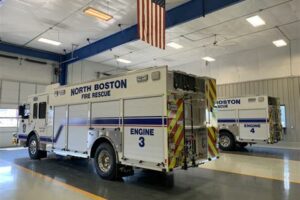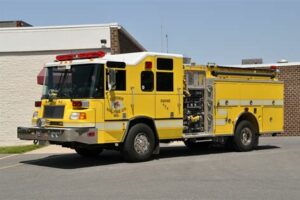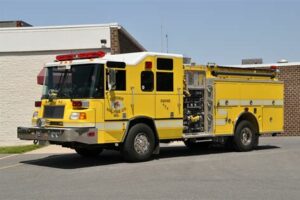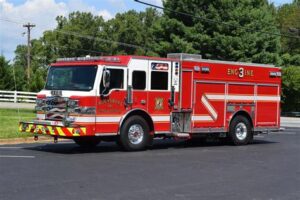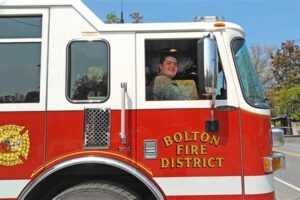Table of Contents
Are you passionate about making a difference in your community? Become a fire station volunteer and play a vital role in ensuring the safety and well-being of your neighbors. Gain valuable skills, help save lives, and contribute to the smooth functioning of emergency response teams. Join us today and make a positive impact as a fire station volunteer!
Firefighters are often hailed as heroes, rushing into burning buildings to save lives and protect property. But what about the unsung heroes who support them behind the scenes? Enter the Fire Station Volunteer – a dedicated group of individuals who selflessly give their time and energy to assist and augment the efforts of our local fire departments. From answering emergency calls to maintaining equipment, these volunteers play a crucial role in ensuring the safety and well-being of our communities. In this article, we will delve into the extraordinary work of these everyday heroes, shedding light on the invaluable contributions they make and the challenges they face.
The Unsung Heroes: Fire Station Volunteers
Firefighters are known for their bravery and dedication to saving lives and property from the destructive force of fire. However, behind every fire station lies a group of unsung heroes – the fire station volunteers. These individuals selflessly donate their time, skills, and energy to support and assist the firefighting personnel in their crucial mission. Let’s delve into the world of fire station volunteers and acknowledge their invaluable contribution to our communities.
What Does a Fire Station Volunteer Do?
A fire station volunteer plays a vital role in supporting the daily operations and functions of a fire station. While they may not directly engage in firefighting activities, their contributions are indispensable. These dedicated individuals perform a wide range of tasks, including administrative work, maintenance of equipment and vehicles, community education programs, and emergency response support. They work hand-in-hand with professional firefighters, ensuring that the station runs smoothly and efficiently.
Why Become a Fire Station Volunteer?
Volunteering at a fire station is not just an act of kindness; it is a chance to make a real difference in the community. There are several reasons why individuals choose to become fire station volunteers. Some are driven by a sense of civic duty and the desire to give back to society. Others have a passion for firefighting and want to gain firsthand experience in this field. Volunteering can also serve as a stepping stone for those considering a future career as a professional firefighter.
Training and Requirements for Fire Station Volunteers
While volunteering at a fire station does not require the same level of training as becoming a professional firefighter, certain qualifications and training are necessary. Volunteers must undergo basic firefighting training, which includes learning about fire safety protocols, first aid, and emergency response procedures. Additionally, they must pass background checks and meet specific physical fitness standards. These requirements ensure that volunteers are well-prepared to handle various situations and provide support when needed.
Benefits of Being a Fire Station Volunteer
Beyond the satisfaction of serving the community, being a fire station volunteer offers numerous personal benefits. First and foremost, volunteers gain valuable skills and knowledge in firefighting and emergency response, enhancing their own safety awareness. They also develop teamwork and leadership skills through collaboration with professional firefighters and fellow volunteers. Moreover, volunteering provides an opportunity to forge lifelong friendships and create a strong support network within the firefighting community.
Challenges Faced by Fire Station Volunteers
While the role of a fire station volunteer is rewarding, it is not without its challenges. Volunteers often face demanding and unpredictable schedules, as emergencies can occur at any time. Balancing their volunteer work with personal and professional commitments requires strong time management skills. Additionally, volunteers may encounter emotionally distressing situations, witnessing the aftermath of fires and accidents. However, through proper training and support systems, these challenges can be effectively managed.
Supporting Fire Station Volunteers
Recognizing the vital role played by fire station volunteers, it is crucial to provide them with adequate support. Fire departments and communities can contribute by offering ongoing training opportunities to enhance volunteers’ skills and knowledge. Providing mental health resources and counseling services is also essential to help volunteers cope with the emotional toll of their work. Furthermore, acknowledging and appreciating their efforts through public recognition and gratitude goes a long way in boosting their morale.
Joining a Fire Station as a Volunteer
If you are interested in becoming a fire station volunteer, reach out to your local fire department or station to inquire about their volunteer programs. They will provide you with information about the application process, training requirements, and any necessary certifications. Volunteering at a fire station is an exceptional opportunity to make a meaningful impact and become part of a close-knit community dedicated to protecting lives and property.
Show Your Gratitude
Next time you see a fire station or encounter a firefighter, take a moment to appreciate the unsung heroes behind the scenes – the fire station volunteers. Their dedication, commitment, and selflessness deserve our utmost respect and gratitude. Supporting them and recognizing their invaluable contributions helps ensure that fire stations continue to thrive and protect our communities for generations to come.
The Lifeline of Communities: The Dedicated Fire Station Volunteers
In small towns and cities around the world, there exists a group of unsung heroes, tirelessly dedicating their time and efforts to keeping their communities safe. Fire station volunteers, although often operating behind the scenes, are an invaluable asset to any region, ensuring that life-saving emergency services are provided promptly and efficiently. This article sheds light on their selfless work, highlighting their crucial role in maintaining public safety.
Answering the Call of Duty
Fire station volunteers are ordinary citizens who bravely step up to serve their communities in times of crisis. Equipped with courage and a deep sense of civic duty, these individuals generously donate their time to provide assistance during emergencies, offering a glimmer of hope in the face of adversity.
Training and Accreditation
Behind their dedication lie hours of rigorous training and accreditation. Fire station volunteers undergo extensive educational programs to master the fundamentals of firefighting and emergency response techniques. From learning basic first aid to fire suppression strategies, these individuals are well-prepared to face the challenges that come their way.
Equipment and Safety Measures
While fire stations typically provide the infrastructure and equipment required for firefighting, volunteers are trained to handle them effectively. From understanding the proper usage of firefighting apparatus to ensuring personal safety through the use of protective gear, volunteers meticulously follow established safety protocols to mitigate risks during emergency situations.
Community Awareness and Preparedness
Fire station volunteers extend their contributions beyond firefighting by actively engaging in community awareness and preparedness campaigns. Through initiatives such as fire safety workshops, they educate residents about preventive measures and the importance of early detection, ultimately minimizing fire-related incidents.
Support in Public Events
Volunteers are also present during public events to provide valuable support. Whether it’s manning first-aid booths, conducting safety demonstrations, or supervising evacuation procedures, their presence ensures the well-being of attendees, allowing everyone to enjoy public gatherings with peace of mind.
Added Value to Fire Departments
Fire station volunteers are an indispensable asset to local fire departments. Their presence offers a surplus workforce, increasing the department’s operational capacity when faced with multiple emergencies or overwhelming incidents. This augmentation to the existing team amplifies the overall effectiveness of the department, leading to improved safety outcomes.
Personal Growth and Satisfaction
Volunteering at fire stations is not merely a selfless act; it’s an opportunity for personal growth. The experience gained through assisting in challenging situations fosters resilience, teamwork, and quick decision-making skills. The satisfaction derived from knowing that their efforts have saved lives reaffirms the commitment of these volunteers to serve their communities selflessly.
Building Bonds within the Community
Fire station volunteers not only build strong connections with their fellow firefighters but also establish lasting bonds with the members of their community. By embedding themselves within the fabric of society, they become trusted figures, enhancing the overall public perception of fire departments and promoting community cohesiveness.
Conclusion
Fire station volunteers are the backbone of our communities, offering invaluable services that ensure our safety during emergencies. Their selflessness, expertise, and passion exemplify the spirit of community and the humanity that binds us together. As we continue to recognize and appreciate their efforts, let us not forget the significant impact they make in our everyday lives.
Fire Station Volunteer: A Vital Role in the Community
1. Introduction:Fire stations are the backbone of any community, providing essential services such as fire suppression, emergency medical response, and community education. While many people are familiar with the brave firefighters who work tirelessly to keep our neighborhoods safe, there is another crucial group that often goes unnoticed – the dedicated fire station volunteers.
2. Background information:a. Fire station volunteers are individuals who selflessly offer their time and skills to support the operations of local fire departments.b. They play a vital role in assisting firefighters during emergencies and performing various administrative tasks when not on active duty.c. These volunteers come from diverse backgrounds and occupations, ranging from retired professionals to college students looking to gain hands-on experience in the field.
3. Benefits of having fire station volunteers:a. Enhanced emergency response:- Having additional personnel available allows for quicker response times during emergencies, which can be critical in saving lives and minimizing property damage.- Volunteers are often trained in basic firefighting techniques and can assist in tasks such as setting up equipment or providing support to firefighters.b. Community outreach and education:- Fire station volunteers actively participate in community events, educating the public about fire safety, disaster preparedness, and the importance of early detection.- Their presence helps foster positive relationships between fire departments and the communities they serve, promoting trust and cooperation.c. Cost-effective solution:- Utilizing volunteers significantly reduces the financial burden on fire departments, as they provide their services free of charge.- This allows fire departments to allocate their limited resources more effectively, investing in equipment and training for their full-time staff.
4. Challenges faced by fire station volunteers:a. Time commitment:- Balancing volunteer duties with personal and professional obligations can be challenging, requiring a significant commitment of time and energy.- Volunteers often have to be available on short notice, including evenings, weekends, and holidays, to ensure round-the-clock coverage at the fire station.b. Training and certification:- Fire station volunteers undergo comprehensive training to acquire basic firefighting skills, emergency medical response techniques, and knowledge of departmental protocols.- Maintaining these certifications requires regular updates and continuing education, which can be demanding for individuals with other responsibilities.c. Emotional toll:- Firefighters and volunteers alike are exposed to traumatic experiences, witnessing accidents, injuries, and loss of life.- The emotional impact of these incidents should not be overlooked, and proper support systems must be in place to ensure the well-being of all personnel.
5. Conclusion:Fire station volunteers are unsung heroes who make invaluable contributions to our communities. Their dedication and willingness to serve demonstrate a profound commitment to public safety and the well-being of their fellow citizens. As we recognize the vital role they play, it is essential to support and appreciate these volunteers, ensuring they have the resources and support necessary to continue their remarkable service.
Thank you for visiting our blog to learn more about the invaluable work of fire station volunteers. These dedicated individuals play a crucial role in ensuring the safety and well-being of our communities, often putting their own lives at risk to protect others. In this closing message, we would like to express our utmost gratitude to these unsung heroes and shed light on the importance of their selfless service.
First and foremost, it is essential to recognize the immense bravery exhibited by fire station volunteers. They willingly face dangerous situations, rushing into burning buildings, rescuing trapped individuals, and battling fierce flames. Their unwavering commitment to serving others is nothing short of remarkable. These volunteers undergo rigorous training to acquire the necessary skills and knowledge to handle emergencies efficiently. They are constantly prepared to respond to any crisis, be it a fire, medical emergency, or natural disaster. Their dedication to their communities is truly commendable.
Moreover, fire station volunteers provide vital support to professional firefighters. While many may assume that these volunteers act as mere assistants, their contributions extend far beyond that. Volunteers often form an integral part of firefighting teams, working side by side with professionals to extinguish fires and save lives. By offering their time, skills, and energy, these volunteers alleviate the burden on overworked fire departments, enabling them to respond more effectively to emergencies. The synergy between volunteers and professionals creates a cohesive firefighting unit dedicated to protecting the public.
In addition to their operational roles, fire station volunteers also play a crucial role in community outreach and education. They actively engage with local schools, organizations, and neighborhoods to raise awareness about fire safety measures. Through informative workshops, demonstrations, and public events, they educate individuals on preventive measures and emergency protocols. By sharing their expertise, fire station volunteers empower communities to take proactive steps towards minimizing fire hazards and enhancing personal safety.
In conclusion, fire station volunteers are the backbone of our firefighting services. Their selflessness, courage, and dedication are truly awe-inspiring. They serve as an inspiration to us all, reminding us of the importance of giving back to our communities and protecting one another. As you leave this blog, we encourage you to reflect on the invaluable contributions of these volunteers and consider how you too can make a difference in your own community. Together, we can create safer and more resilient neighborhoods for all.
Video Fire Station Volunteer
People also ask about Fire Station Volunteer:
What is a fire station volunteer?
A fire station volunteer is an individual who offers their time and services to support their local fire station. They assist professional firefighters in various tasks, such as responding to emergency calls, maintaining equipment, conducting inspections, and participating in community outreach programs.
How can I become a fire station volunteer?
To become a fire station volunteer, you should start by contacting your local fire department or fire station. They will provide you with information on the specific requirements and application process. Typically, volunteers must be at least 18 years old, pass a background check, complete training programs, and commit to a certain number of hours per week or month.
What are the benefits of being a fire station volunteer?
Being a fire station volunteer offers numerous benefits. Firstly, it allows you to contribute to the safety and well-being of your community. You’ll gain valuable skills and knowledge related to firefighting and emergency response. Additionally, volunteering at a fire station can be a rewarding and fulfilling experience, as you’ll work closely with dedicated professionals and make a positive impact on people’s lives.
Can I volunteer at a fire station without any prior experience?
Yes, many fire stations welcome volunteers without prior experience. They provide comprehensive training programs to equip volunteers with the necessary skills and knowledge. These programs cover basic firefighting techniques, first aid, CPR, and other relevant topics. However, having prior experience or relevant qualifications in areas such as medical assistance or emergency management can be advantageous.
Are there any risks associated with being a fire station volunteer?
While volunteering at a fire station can involve certain risks due to the nature of the work, adequate training and safety protocols are in place to mitigate these risks. Fire departments prioritize the well-being of their volunteers and ensure they have the necessary protective gear and equipment. It’s important to follow guidelines, stay alert, and communicate effectively with the professional firefighters to maintain a safe environment.
Remember, specific requirements and procedures may vary depending on the fire department or station you are interested in volunteering with. It is always recommended to reach out to them directly for accurate and up-to-date information.

